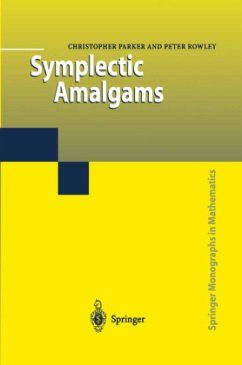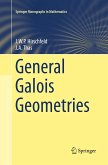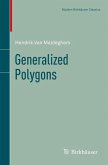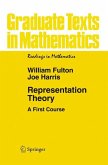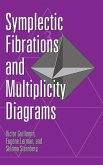- Broschiertes Buch
- Merkliste
- Auf die Merkliste
- Bewerten Bewerten
- Teilen
- Produkt teilen
- Produkterinnerung
- Produkterinnerung
The aim of this book is the classification of symplectic amalgams - structures which are intimately related to the finite simple groups. In all there sixteen infinite families of symplectic amalgams together with 62 more exotic examples. The classification touches on many important aspects of modern group theory: * p-local analysis * the amalgam method * representation theory over finite fields; and * properties of the finite simple groups. The account is for the most part self-contained and the wealth of detail makes this book an excellent introduction to these recent developments for…mehr
Andere Kunden interessierten sich auch für
![General Galois Geometries General Galois Geometries]() James HirschfeldGeneral Galois Geometries64,99 €
James HirschfeldGeneral Galois Geometries64,99 €![Finite Geometries Finite Geometries]() Peter DembowskiFinite Geometries43,99 €
Peter DembowskiFinite Geometries43,99 €![Generalized Polygons Generalized Polygons]() Hendrik Van MaldeghemGeneralized Polygons67,99 €
Hendrik Van MaldeghemGeneralized Polygons67,99 €![Representation Theory Representation Theory]() Joe HarrisRepresentation Theory50,99 €
Joe HarrisRepresentation Theory50,99 €![A Brief Journey from Euclidean to Smarandachean Geometry A Brief Journey from Euclidean to Smarandachean Geometry]() Erick González CaballeroA Brief Journey from Euclidean to Smarandachean Geometry27,99 €
Erick González CaballeroA Brief Journey from Euclidean to Smarandachean Geometry27,99 €![Equivariant Surgery Theories and Their Periodicity Properties Equivariant Surgery Theories and Their Periodicity Properties]() Karl H. DovermannEquivariant Surgery Theories and Their Periodicity Properties35,99 €
Karl H. DovermannEquivariant Surgery Theories and Their Periodicity Properties35,99 €![Symplectic Fibrations and Multiplicity Diagrams Symplectic Fibrations and Multiplicity Diagrams]() Victor GuilleminSymplectic Fibrations and Multiplicity Diagrams126,99 €
Victor GuilleminSymplectic Fibrations and Multiplicity Diagrams126,99 €-
-
-
The aim of this book is the classification of symplectic amalgams - structures which are intimately related to the finite simple groups. In all there sixteen infinite families of symplectic amalgams together with 62 more exotic examples. The classification touches on many important aspects of modern group theory: * p-local analysis * the amalgam method * representation theory over finite fields; and * properties of the finite simple groups. The account is for the most part self-contained and the wealth of detail makes this book an excellent introduction to these recent developments for graduate students, as well as a valuable resource and reference for specialists in the area.
Produktdetails
- Produktdetails
- Springer Monographs in Mathematics
- Verlag: Springer / Springer London / Springer, Berlin
- Artikelnr. des Verlages: 978-1-4471-1088-0
- Softcover reprint of the original 1st ed. 2002
- Seitenzahl: 376
- Erscheinungstermin: 8. Oktober 2012
- Englisch
- Abmessung: 235mm x 155mm x 21mm
- Gewicht: 575g
- ISBN-13: 9781447110880
- ISBN-10: 1447110889
- Artikelnr.: 36937196
- Herstellerkennzeichnung
- Springer-Verlag GmbH
- Tiergartenstr. 17
- 69121 Heidelberg
- ProductSafety@springernature.com
- Springer Monographs in Mathematics
- Verlag: Springer / Springer London / Springer, Berlin
- Artikelnr. des Verlages: 978-1-4471-1088-0
- Softcover reprint of the original 1st ed. 2002
- Seitenzahl: 376
- Erscheinungstermin: 8. Oktober 2012
- Englisch
- Abmessung: 235mm x 155mm x 21mm
- Gewicht: 575g
- ISBN-13: 9781447110880
- ISBN-10: 1447110889
- Artikelnr.: 36937196
- Herstellerkennzeichnung
- Springer-Verlag GmbH
- Tiergartenstr. 17
- 69121 Heidelberg
- ProductSafety@springernature.com
Interest in this field is widening and so the proof has to be readable by more than just specialists in amalgams. This book provides a complete overview of research in the field that is accessible to both specialists and non-specialists alike and is written by two of the world's most notable specialists in group amalgams.
1 Introduction.- 1.1 Symplectic Amalgams.- 1.2 Goldchmidt G4-Amalgam Again.- 2 Preliminaries.- 2.1 Some Group Theory Results.- 2.2 Some Representation Theory Results.- 2.3 Sesquilinear Forms.- 2.4 Two Theorems of McLaughlin.- 2.5 Ultraspecial and Extraspecial Groups.- 2.6 Tensor Products and Group Actions on p-Groups.- 2.7 The Goldschmidt Amalgams.- 3 The Structure of SL2(q) and its Modules.- 3.1 Group Theoretic Properties of SL2(q).- 3.2 Modules for SL2(q).- 4 Elementary Properties of Symplectic Amalgams.- 4.1 The Coset Graph.- 4.2 Proof of Theorem 1.6.- 5 The Structure of Q?.- 6 The L?-Chief Factors in V?.- 7 Reduced Symplectic Amalgams.- 7.1 A Reduced Symplectic Subamalgam.- 7.2 Reduced Amalgams and Consequences of Theorem 6.1.- 8 The Largest Normal p?-Subgroup of L?/Q?.- 9 The Components of L?/Q?.- 9.1 The Action of L? on Compp(L?).- 9.2 Two or more Normal Components in L?/Q?.- 10 The Reduction to Quasisimple when $$C_{U_\alpha } (U_\alpha /Z_\alpha ) \nleqslant Q_\beta$$.- 11 A First Look at the Amalgams with V?/Z(V?) = q4.- 11.1 A Characteristic 3 Amalgam.- 11.2 The Proof of Theorem 11.1.- 12 The Story so Far.- 13 Groups of Lie Type.- 13.1 Weyl Groups and Parabolic Subgroups.- 13.2 Sylow p-subgroups of Lie Type Groups.- 13.3 Automorphisms and Centres.- 13.4 The Order of Abelian p-subgroups.- 13.5 Extremal Subgroups.- 14 Modules for Groups of Lie Type.- 14.1 Modules in Characteristic p.- 14.2 Module Results for Low Rank Groups of Lie Type.- 14.3 Modules for Lie Type Groups and (2, q)-Transvections.- 14.4 Natural Modules for Orthogonal Groups.- 14.5 Natural Modules for the Symplectic Groups.- 14.6 Natural Modules for G2(q).- 14.7 Some Spin Modules.- 14.8 Modules for Lie Type Groups in Non-defining Characteristic.- 14.9 Some Non-containments.-15 Sporadic Simple Groups and Their Modules.- 16 Alternating Groups and Their Modules.- 17 Rank One Groups.- 18 Lie Type Groups in Characteristic p and Rank ?.- 18.1 A Subamalgam of A.- 18.2 The Examples.- 18.3 L?/Q? a Symplectic Group and V?/Z(V?) a Spin Module.- 19 Lie Type Groups and Natural Modules.- 19.1 The Symplectic and Orthogonal Groups.- 19.2 Sp4(2) - A Special Case.- 19.3 Groups of Type G2(q).- 20 Lie Type Groups in Characteristic not p.- 21 Alternating Groups.- 21.1 Large Alternating Groups.- 21.2 Small Alternating Groups.- 22 Sporadic Simple Groups.- 23 The Proof of the Main Theorems.- 24 A Brief Survey of Amalgam Results.- 24.1 Amalgam Results.- 24.2 Pushing-up.- References.- Indexs.
1 Introduction.- 1.1 Symplectic Amalgams.- 1.2 Goldchmidt G4-Amalgam Again.- 2 Preliminaries.- 2.1 Some Group Theory Results.- 2.2 Some Representation Theory Results.- 2.3 Sesquilinear Forms.- 2.4 Two Theorems of McLaughlin.- 2.5 Ultraspecial and Extraspecial Groups.- 2.6 Tensor Products and Group Actions on p-Groups.- 2.7 The Goldschmidt Amalgams.- 3 The Structure of SL2(q) and its Modules.- 3.1 Group Theoretic Properties of SL2(q).- 3.2 Modules for SL2(q).- 4 Elementary Properties of Symplectic Amalgams.- 4.1 The Coset Graph.- 4.2 Proof of Theorem 1.6.- 5 The Structure of Q?.- 6 The L?-Chief Factors in V?.- 7 Reduced Symplectic Amalgams.- 7.1 A Reduced Symplectic Subamalgam.- 7.2 Reduced Amalgams and Consequences of Theorem 6.1.- 8 The Largest Normal p?-Subgroup of L?/Q?.- 9 The Components of L?/Q?.- 9.1 The Action of L? on Compp(L?).- 9.2 Two or more Normal Components in L?/Q?.- 10 The Reduction to Quasisimple when $$C_{U_\alpha } (U_\alpha /Z_\alpha ) \nleqslant Q_\beta$$.- 11 A First Look at the Amalgams with V?/Z(V?) = q4.- 11.1 A Characteristic 3 Amalgam.- 11.2 The Proof of Theorem 11.1.- 12 The Story so Far.- 13 Groups of Lie Type.- 13.1 Weyl Groups and Parabolic Subgroups.- 13.2 Sylow p-subgroups of Lie Type Groups.- 13.3 Automorphisms and Centres.- 13.4 The Order of Abelian p-subgroups.- 13.5 Extremal Subgroups.- 14 Modules for Groups of Lie Type.- 14.1 Modules in Characteristic p.- 14.2 Module Results for Low Rank Groups of Lie Type.- 14.3 Modules for Lie Type Groups and (2, q)-Transvections.- 14.4 Natural Modules for Orthogonal Groups.- 14.5 Natural Modules for the Symplectic Groups.- 14.6 Natural Modules for G2(q).- 14.7 Some Spin Modules.- 14.8 Modules for Lie Type Groups in Non-defining Characteristic.- 14.9 Some Non-containments.-15 Sporadic Simple Groups and Their Modules.- 16 Alternating Groups and Their Modules.- 17 Rank One Groups.- 18 Lie Type Groups in Characteristic p and Rank ?.- 18.1 A Subamalgam of A.- 18.2 The Examples.- 18.3 L?/Q? a Symplectic Group and V?/Z(V?) a Spin Module.- 19 Lie Type Groups and Natural Modules.- 19.1 The Symplectic and Orthogonal Groups.- 19.2 Sp4(2) - A Special Case.- 19.3 Groups of Type G2(q).- 20 Lie Type Groups in Characteristic not p.- 21 Alternating Groups.- 21.1 Large Alternating Groups.- 21.2 Small Alternating Groups.- 22 Sporadic Simple Groups.- 23 The Proof of the Main Theorems.- 24 A Brief Survey of Amalgam Results.- 24.1 Amalgam Results.- 24.2 Pushing-up.- References.- Indexs.

